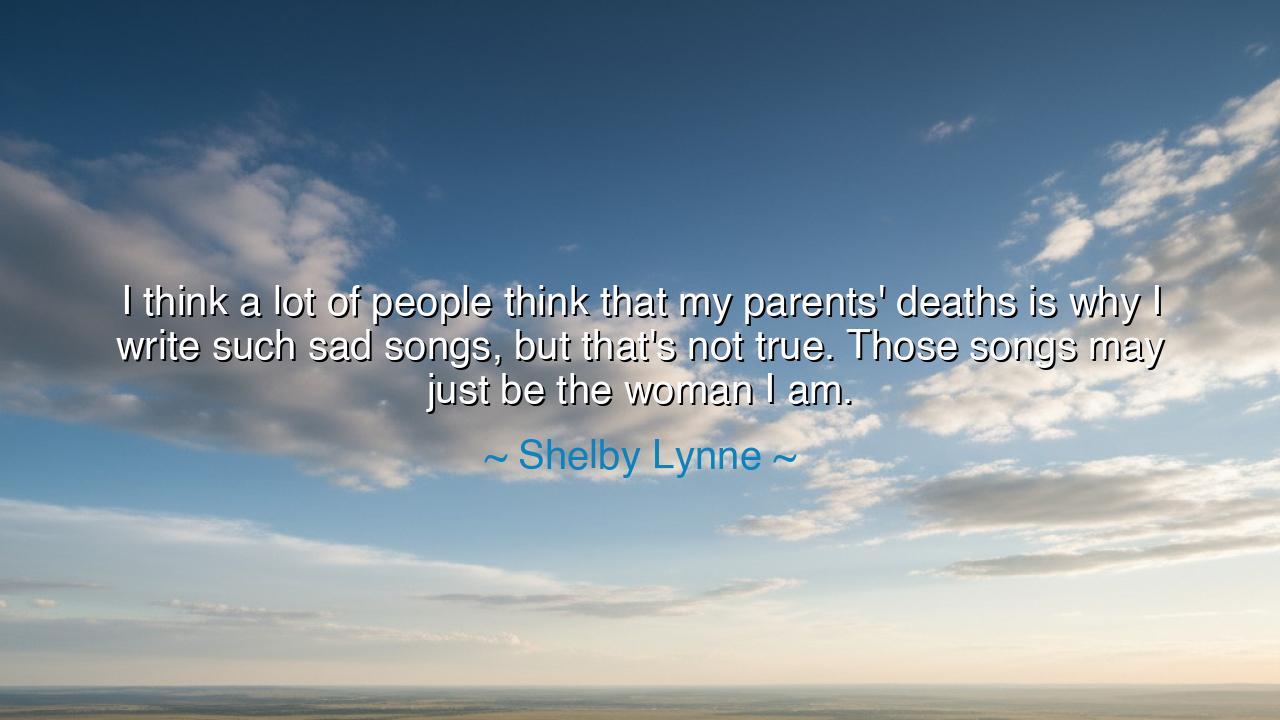
I think a lot of people think that my parents' deaths is why I
I think a lot of people think that my parents' deaths is why I write such sad songs, but that's not true. Those songs may just be the woman I am.






The words of Shelby Lynne, “I think a lot of people think that my parents’ deaths is why I write such sad songs, but that’s not true. Those songs may just be the woman I am,” flow from the deep river of a soul acquainted with both sorrow and self-knowledge. Beneath their quiet tone lies a powerful truth about identity, art, and the mystery of the human spirit. In them, Lynne rejects the notion that art must always be the echo of trauma, declaring instead that sadness, when it appears in her work, is not merely a scar—it is an essence, an integral part of who she is. The sadness she sings is not pity, but presence; not the shadow of loss, but the language of being.
In the ancient sense, this quote speaks to the eternal struggle between fate and character, between what happens to us and who we become. Many in the world believe that artists are born from their wounds, that pain alone gives birth to beauty. Yet Lynne, through her quiet defiance, reminds us that suffering may shape us, but it does not define us. Grief is an event; identity is a creation. To write from sadness is not to be consumed by it—it is to have learned its rhythm, to understand that melancholy is not merely a memory of pain but a tone of perception. Some souls are born with a deeper sensitivity, a greater capacity for reflection, and through them, sorrow becomes not tragedy, but art.
Lynne’s words rise from a real and painful history. As a child, she endured a profound trauma—the deaths of her parents in an act of violence that could have broken the human heart beyond repair. Many, looking upon her later success, assumed that her music was a cry from that wound, that her art existed only as an outlet for tragedy. But Lynne resists this narrative. Her statement is not denial—it is transcendence. She acknowledges her loss but refuses to be imprisoned by it. In doing so, she teaches that even in the aftermath of suffering, one may grow into a self that is not only shaped by pain but also illuminated by choice, by grace, by individuality.
There is a reflection of this truth in the story of the ancient poet Sappho of Lesbos, whose verses have survived through centuries of ruin and silence. The world, hearing her aching lines of love and longing, assumed she must have been broken-hearted. Yet scholars now see that Sappho’s melancholy was not simply born of loss—it was her way of perceiving beauty, a temperament of soul that saw life’s fleeting sweetness and sang of it. Like Sappho, Shelby Lynne reveals that sadness in art is not always a wound being healed; sometimes, it is simply the natural color of the artist’s heart.
In Lynne’s words, there is also the quiet power of ownership. She claims her sadness, not as a victim, but as a creator. “Those songs may just be the woman I am,” she says—and in doing so, she transforms emotion into identity, and identity into strength. It is a declaration of authenticity, a refusal to let others write her story for her. The ancients revered such honesty, for they believed that the greatest act of courage is to know oneself and to stand firm in that knowledge, even when the world demands explanation or simplification. To live as an artist, as a truth-teller, is to endure misunderstanding; but as Lynne shows, it is better to be misread than to be false.
There is a lesson here for all who create, love, or suffer: that pain may shape your path, but it does not dictate your destination. The world will always try to trace the map of your soul back to its wounds, to explain your depth through your damage. But your emotions, your sensitivity, your sadness—these may simply be the voice of your spirit speaking in its own language. To know yourself is to recognize what belongs to you and what does not—to separate the inherited sorrow from the chosen song.
So let this teaching be passed down: Do not let others define the origin of your art, your sorrow, or your strength. You are not merely the sum of what has happened to you—you are the one who gives it meaning. If sadness flows through you, let it speak not as a remnant of pain, but as an instrument of truth. For there are souls, rare and luminous, who carry sorrow not as a burden but as a vision—who turn melancholy into music, and grief into grace. As Shelby Lynne teaches us, the songs we create from our hearts do not always arise from wounds—they arise from the mysterious and beautiful depths of who we truly are.






AAdministratorAdministrator
Welcome, honored guests. Please leave a comment, we will respond soon